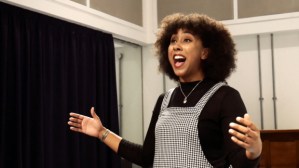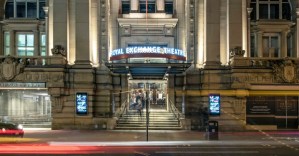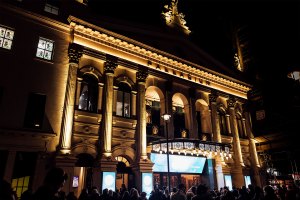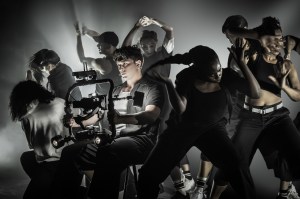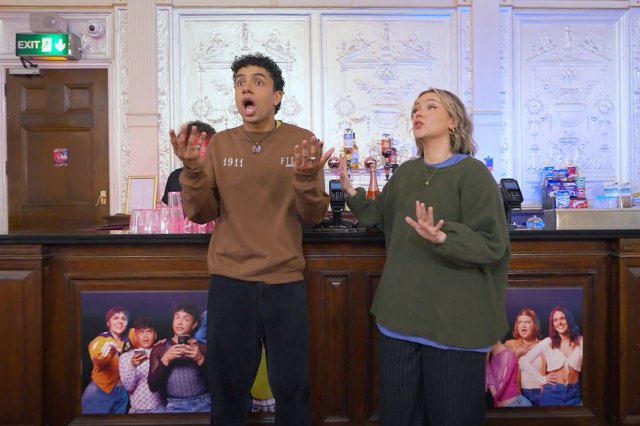Review: The Producers (Royal Exchange, Manchester)
Mel Brooks’ tricksy musical is revived in the round at the Manchester Royal Exchange
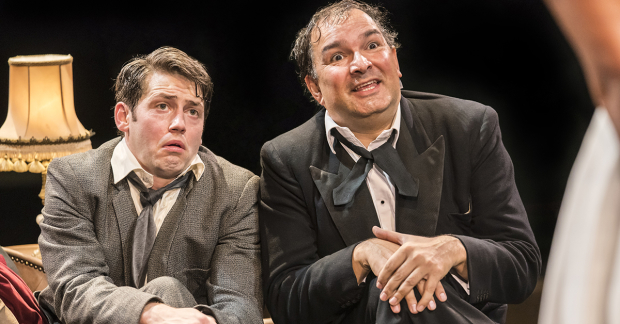
© Johan Persson
Of those attending The Producers at the Royal Exchange, none could ever claim that it is a musical lacking in energy. Regardless of whether one considers Adolf Hitler singing and dancing in tight black lederhosen to be uncomfortable-making, the show is, at the very least, entertaining.
The Producers first made its appearance as a feature film over fifty years ago before being adapted for the stage by creator and writer Mel Brooks in 2001. The tale revolves around a couple of opportunistic theatre producers, Max Bialystock (Julius D'Silva) and Leo Bloom (Stuart Neal), trying to make a fast buck by deliberately creating a terrible musical. The duo actively aim to find the worst script, director and cast imaginable and the result is Springtime for Hitler: A Gay Romp with Adolf and Eva at Berchtesgaden. Bialystock and Bloom envisage their Broadway monstrosity closing on opening night, in turn allowing them to escape to Brazil with the majority of the production's budget.
The Producers' director Raz Shaw stated that one of the challenges with this revival was whether it would prove possible translating a huge Broadway musical to the intimacy of the round. The crowd's reaction on the night I saw it suggests the answer is a resounding yes. The Producers is not a pantomime, but a newcomer to the piece could have easily been mistaken and not only because of the buzzing Christmas markets outside the Exchange on the streets of Manchester.
It is the performances of Charles Brunton as ostentatious theatre director Roger De Bris and Hammed Animashaun as his assistant Carmen that provide the show's true comic highlights – watching Brunton lowered to the stage on a gigantic German eagle during his star turn as Adolf Hitler is one of the memorable moments of the production. Overall, both the choreography and music departments deserve enormous credit; some of the show's dancing scenes are superb and dovetail seamlessly with the small live orchestra nestled into the first level of the round.
If there is a question mark over the production, one might query some of the more inappropriate jokes involving Bialystock and Bloom's Swedish secretary Ulla. Only a year on from the Weinstein scandal and in the midst of the #MeToo movement, watching a powerful entertainment mogul such as Bialystock make sexual advances toward a young female assistant feels uncomfortable. This is not to discount Emily-Mae's performance as the Scandinavian beauty in the slightest; it is to her testament that moments after the giddy rendition of "Keep It Gay", the audience were perfectly silent for her powerful delivery of "When You Got It, Flaunt It".
Ultimately, if the story seems somewhat outdated for 2018, part of the show's attraction is the fact that it frequently treads a line between what is considered politically correct and what is not. Just like Bialystock himself exclaims upon finding the script for Springtime for Hitler, at points The Producers is "guaranteed to offend all races, colours and creeds!". This does not stop the show from being very funny, aligning with Brooks' original aim of making "terrible things entertaining". At one point in Shaw's production, De Bris' ensemble use glittery shields to create a gigantic sparkling swastika – in a single image, this seems like the kind of vision Brooks might have had in mind.




